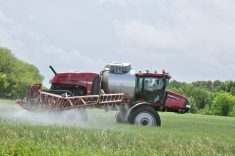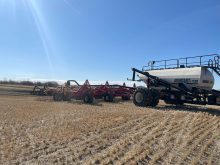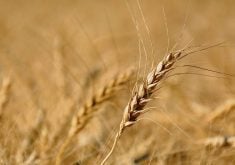Some in the industry wonder whether they are wasting their time discussing how to improve Canada’s wheat registration system.
Recent history shows that while Agriculture Minister Gerry Ritz offers to consult with all of the industry, he only listens to a few.
“Ritz listens to the Wheat Growers and Grain Growers of Canada more than to his own staff and appointees,” one industry participant bluntly said recently.
Examples include ending the Canadian Wheat Board’s monopoly without a farmer vote and abruptly scrapping kernel visual distinguishability as a requirement for wheat registration, even though the industry itself had a plan to phase it out.
Read Also

CUSMA access key among other trade noise: Seeds Canada panel
Seeds Canada conference panelists say Canada needs to stay focused and wait as U.S. trade and tariff chaos develops, and a Canada-U.S.-Mexico Agreement review looms
Now Ritz has asked all variety recommending committees, including wheat, to streamline the variety registration recommending process.
A year ago the grain industry reached a consensus on wheat variety registration, changes that would protect Canada’s wheat brand for Canada Western Red Spring wheat and durum, while enabling farmer access through the Canada Prairie Spring class to Dark Northern Spring wheats from the U.S. that are perceived to be higher yielding, albeit lower protein.
Not good enough. The minority position promoted by the WCWGA would throw the system wide open to any variety brought forward. Disease and agronomy assessments that are now compulsory would become voluntary. There would be testing for end-use quality, but only to determine which class it fits and it would take place after it’s already in the system.
No one opposes improving the wheat registration system. There’s talk of shortening the number of years of pre-registration merit testing, or reducing the number of test sites, having fewer check varieties, fewer quality measurements and a smaller recommending committee.
But what the WCWGA suggests would diminish the current wheat quality control system. And on that, it is a lone voice.
The Canadian National Millers Association “holds the current variety evaluation and registration system in high regard.”
“Don’t throw the baby out with the bathwater,” warned Terry James, Richardson International’s vice-president of export marketing, at last year’s Canada Grains Council annual meeting.
Elwin Hermanson, chief commissioner of the Canadian Grain Commission (CGC), recently defended the system as the cornerstone to Canada’s wheat quality assurance system.
You’d think the views of the second-biggest grain company operating in Canada, Canadian millers, the CGC and Ritz’s trusted friend would have some sway.
Don’t count on it.
According to the WCWGA, the changes would get improved varieties to farmers faster. But Todd Hyra, SeCan’s business manager for Western Canada, said last November the wheat registration system doesn’t impede innovation, it’s lack of investment — mainly because there is a lack of return on investment.
Farmers often grow saved wheat seed instead of buying new as they do with corn, soybeans and canola. It saves farmers money but limits what seed developers make selling new varieties.
Whether the current system continues or not, farmers and end-users still need data, Agriculture and Agri-Food Canada wheat breeder Ron DePauw told the wheat recommending committee at its annual meeting in February.
Farmers need to know before seeding how a new wheat will perform and whether there’ll be a market.
Millers, bakers and noodle makers need to know ahead how a new wheat will perform in their facilities.
What DePauw didn’t say, but is obvious — it makes more sense to have that data before planting than after.



















